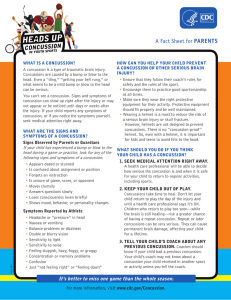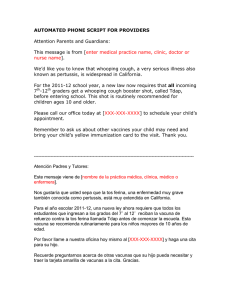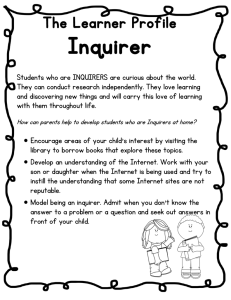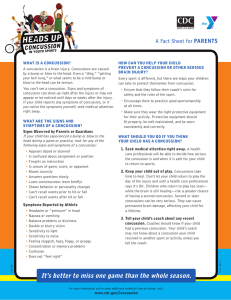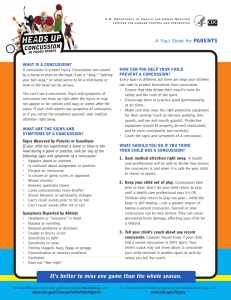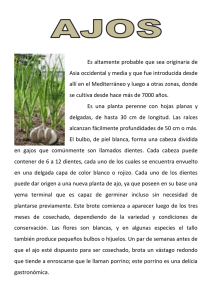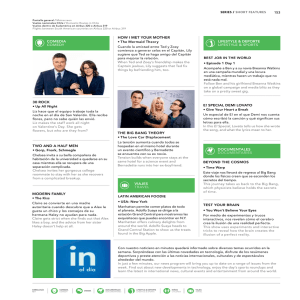CONCUSSION
Anuncio
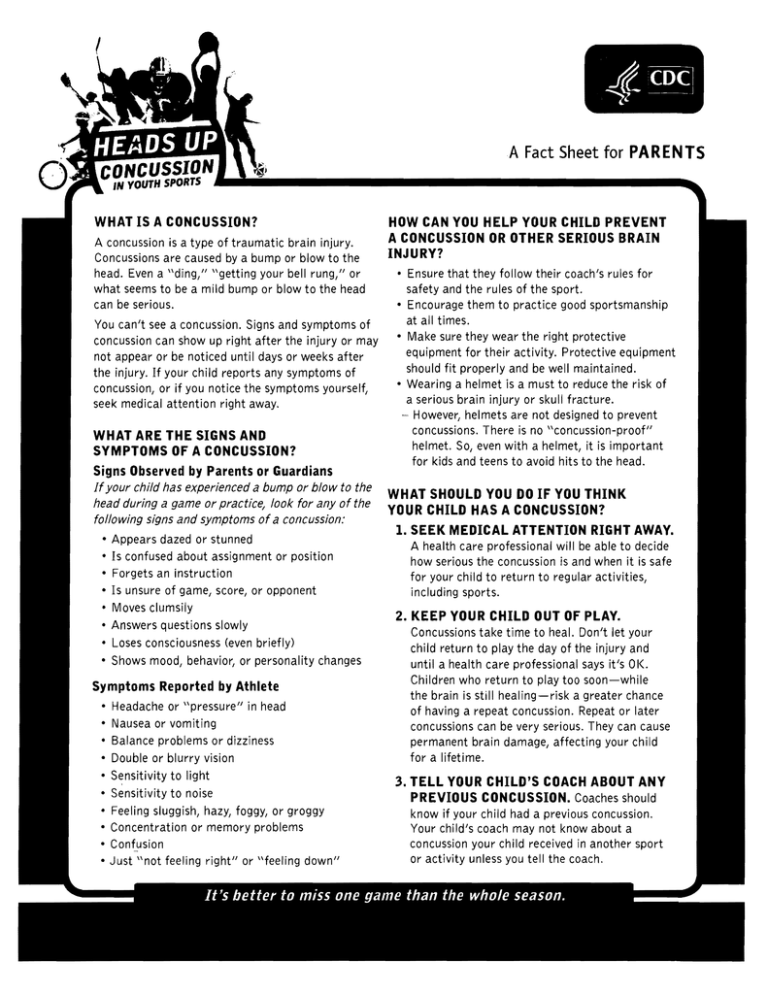
A Fact Sheet for PARENTS CONCUSSION IN YOUTH SpORTS WHAT IS A CONCUSSION? A concussion is a type of traumatic brain injury. Concussions are caused by a bump or blow to the head. Even a "ding," "getting your bell rung," or what seems to be a mild bump or blow to the head can be serious. You can't see a concussion. Signs and symptoms of concussion can show up right after the injury or may not appear or be noticed until days or weeks after the injury. If your child reports any symptoms of concussion, or if you notice the symptoms yourself, seek medical attention right away. WHAT ARE THE SIGNS AND SYMPTOMS OF A CONCUSSION? Signs Observed by Parents or Guardians If your child has experienced a bump or blow to the head during a game or practice, look for any of the fol/owing signs and symptoms of a concussion: • Appears dazed or stunned • Is confused about assignment or position • Forgets an instruction • Is unsure of game, score, or opponent • Moves clumsily • Answers questions slowly • Loses consciousness (even briefly) • Shows mood, behavior, or personality changes Symptoms Reported by Athlete • Headache or \\pressure" in head • Nausea or vomiting • Balance problems or dizziness • Double or blurry vision • Sensitivity to light . • Sensitivity to noise • Feeling sluggish, hazy, foggy, or groggy • Concentration or memory problems • Confusion • Just \\not feeling right" or "feeling down" HOW CAN YOU HELP YOUR CHILD PREVENT A CONCUSSION OR OTHER SERIOUS BRAIN INJURY? • Ensure that they follow their coach's rules for safety and the rules of the sport. • Encourage them to practice good sportsmanship at all times. • Make sure they wear the right protective equipment for their activity. Protective equipment should fit properly and be well maintained. • Wearing a helmet is a must to reduce the risk of a serious brain injury or skull fracture. - However, helmets are not designed to prevent concussions. There is no \\concussion-proof" helmet. So, even with a helmet, it is important for kids and teens to avoid hits to the head. WHAT SHOULD YOU DO IF YOU THINK YOUR CHILD HAS A CONCUSSION? 1. SEEK MEDICAL ATTENTION RIGHT AWAY. A health care professional will be able to decide how serious the concussion is and when it is safe for your child to return to regular activities, including sports. 2. KEEP YOUR CHILD OUT OF PLAY. Concussions take time to heal. Don't let your child return to play the day of the injury and until a health care professional says it's 01<. Children who return to play too soon-while the brain is still healing-risk a greater chance of having a repeat concussion. Repeat or later concussions can be very serious. They can cause permanent brain damage, affecting your child for a lifetime. 3. TELL YOUR CHILD'S COACH ABOUT ANY PREVIOUS CONCUSSION. Coaches should know if your child had a previous concussion. Your child's coach may not know about a concussion your child received in another sport or activity unless you tell the coach. Hoja Informativa para los PADRES CONMOCION CEREBRAL EN EL DEPORTE JUVENIL ,QUE ES LA CONMOCION CEREBRAL? Una conmocion cerebral es una lesion en el cerebro, causada por un golpe en la cabeza 0 una sacudida. Incluso una pequena conmoci6n 0 10 que parece ser un golpe 0 sacudida leve puede ser serio. La conmocion cerebral no puede verse. Los signos y sintomas de una conmoci6n pueden aparecer inmediatamente despues de la lesion 0 puede que no aparezcan, 0 se hagan visibles algunos dfas 0 meses despues de haber sufrido la lesi6n. Si su hijo tiene los signos de una conmoci6n cerebral 0 si usted nota algun sfntoma, busque atencion n1edica de inmediato. ,CUALES SON LOS SIGNOS Y SINTOMAS DE LA CONMOCION CEREBRAL? Signos que notan los padres y los tutores Si su hljo ha sufrido un gofpe en fa cabeza 0 una sacudida durante un juego 0 una practical observefo para determinar si tiene alguno de los siguientes signos y sfntomas de una conmoci6n cerebral: • Luce aturdido 0 fuera de control • Se confunde con la actividad asignada • Olvida las jugadas • No se muestra seguro del juego, la puntuaci6n ni de sus adversari os • Se mueve con torpeza • Responde con lentitud • Pierde el conocimiento (asf sea momentaneamente) • Muestra cambios de conducta 0 de personalidad • No puede recordar 10 ocurrido antes de un lanzamiento 0 un calda • No puede recordar 10 ocurrido despues de un lanzamiento o un carda Sfntomas que reporta el atleta • Dolor 0 "presion" en la cabeza • Nauseas 0 vomitos • Problemas de equilibrio, mareo • Vision doble 0 borrosa • Sensibilidad a la luz y al ruido • Se siente debil, confuso, aturdido 0 grogui • Problemas de concentraci6n 0 men10ria • Confusion • No se "siente bien" ,COMO AYUDAR A SU HIJO A PREVENIR UNA CONMOCION CEREBRAL? Aunque todo deporte es diferente, hay medidas que puede tomar para protegerse. • Haga que siga las reg las in1partidas por el entrenador y las reg las del deporte que practica. • Invltelo a mantener el espiritu deportivo en todo momento. • Haga que su hijo use el equipo protector adecuado segun la actividad que realiza. EI equipo de proteccion debe ajustarse bien, debe hacersele el mantenimiento adecuado, y el jugador debe usarlo correctamente y en todo momento. ,QUE DEBE HACER SI CREE QUE SU HIJO HA SUFRIDO UNA CONMOCION CEREBRAL? 1. Busque atenci6n medica de inmediato. Un professional de la salud podra determinar la seriedad de la conmocion cerebral que ha sufrido el nino y cuando podra regresar al juego sin riesgo alguno. 2. No permita que su hijo siga jugando. Las conmociones cerebrales necesitan de un cierto tiempo para curarse. No permita que su hijo regrese al juego hasta que un professional de la salud Ie haya dicho que puede hacerlo. Los ninos que regresan al juego antes de 10 debido-mientras el cerebro esta en proceso de curaci6n-corren un mayor riesgo de sufrir otra conmoci6n. Las conmociones cerebrales siguientes pueden ser muy serias. Pueden causar dano cerebral permanente que afectaran al nino de por vida. 3. Informe al entrenador del nino sobre cualquier conmocion cerebral que el nino haya sufrido recientemente. Los entrenadores deben saber si el nino ha sufrido una conmoci6n recientemente en CUALQUIER deporte. EI entrenador no necesariamente sabra si el nino ha tenido una conmoci6n en otro deporte o actividad a menos que usted se 10 diga.
